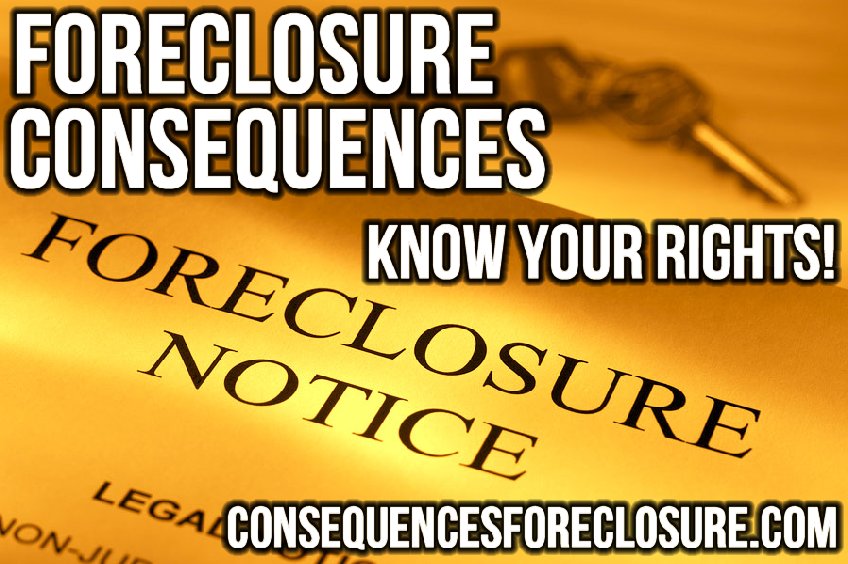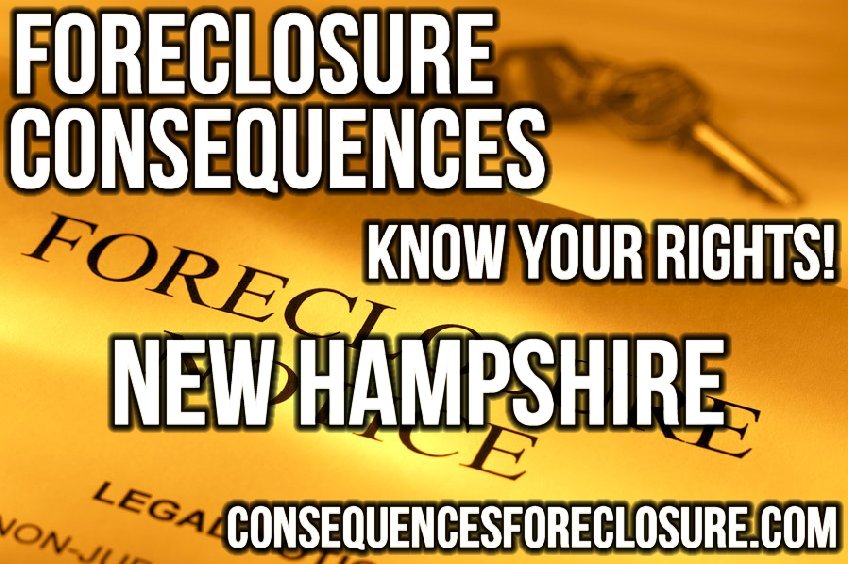 Foreclosure Consequences - Consequences of Foreclosure
Foreclosure Consequences - Consequences of Foreclosure
Foreclosure Consequences in New Hampshire - NH

Foreclosure Summary copyright, © ForeclosureLaw.org
Quick Facts
Quick Facts
Judicial Foreclosure Available: Yes
Non-Judicial Foreclosure Available: Yes
Primary Security Instruments: Deed of Trust, Mortgage
Timeline: Varies by Process; Typically 60 days
Right of Redemption: None
Deficiency Judgments Allowed: Yes
In New Hampshire, lenders may foreclose on a mortgage or deed of trust in default by using either the judicial or non-judicial foreclosure processes or any of the following special methods: Entry under Process, Entry and Publication or Possession and Publication.
Judicial Foreclosure
In New Hampshire, the judicial process of foreclosure is very similar to that of the strict foreclosure process used in other New England states. The judicial foreclosure process is one in which the lender must file a complaint against the borrower and obtain a decree of sale from a court having jurisdiction in the county where the property is located before foreclosure proceedings can begin. Generally, if the court finds the borrower in default, they will give them a set period of time to pay the delinquent amount, plus costs. If the borrower does not pay within the set period of time, the court will then order the property to be sold. Anyone may bid at the foreclosure sale, including the lender.
Non-Judicial Foreclosure
The non-judicial process of foreclosure is used when a power of sale clause exists in a mortgage or deed of trust. A "power of sale" clause is the clause in a deed of trust or mortgage, in which the borrower pre-authorizes the sale of property to pay off the balance on a loan in the event of the their default. In deeds of trust or mortgages where a power of sale exists, the power given to the lender to sell the property may be executed by the lender or their representative, typically referred to as the trustee. Regulations for this type of foreclosure process are outlined below in the "Power of Sale Foreclosure Guidelines".
Power of Sale Foreclosure Guidelines
If the deed of trust or mortgage contains a power of sale clause and specifies the time, place and terms of sale, then the specified procedure must be followed. Otherwise, the non-judicial power of sale foreclosure is carried out in the following phases:
A notice of sale must be recorded in the county where the property is located and then: 1) mailed to the borrower at least twenty-five (25) days before the sale; and 2) published once a week for three (3) weeks, with the first publication appearing not less than twenty (20) days before the sale, in a newspaper of general circulation in the county where the property is located.
The notice should contain the time, date and place of sale, a description of the property and the default, as well as a "warning" to the borrower, informing him the property is going to be sold and what rights he has to stop the procedure.
The foreclosure sale must be held on the property itself, unless the power of sale clause specifies a different location.
Special Methods of Foreclosure
- Entry under Process - The lender may foreclose by entering the property under process of law and maintaining actual possession of the property for one year.
- Entry and Publication - By peaceable entry onto the property and continued, actual, peaceable possession for a period of one year, and by a publishing a notice stating the time of possession, the lender and borrowers name, the date of the mortgage and a description of the property in a newspaper of general circulation in the county where the property is located. The notice must be published for three (3) successive weeks, with the first publication appearing at least six (6) months before the borrowers right to redeem has expired.
- Possession and Publication - By the lender in possession of the property publishing a notice stating that from and after a certain day, the property will be held for default of the mortgage and the borrowers rights to the property will be foreclosed. Said notice must be published in a newspaper printed in the county where the property is located for three (3) successive weeks and must give the borrower and lenders name, the date of the mortgage, a description of the property and the lenders intention to hold possession of the property for at least one (1) year.
Borrowers have no rights of redemption when any of the three (3) special methods of foreclosure are used.
More information on New Hampshire foreclosure laws
Learn all about foreclosure consequences in Alabama: AL, foreclosure consequences in Alaska: AK, foreclosure consequences in Arizona: AZ, foreclosure consequences in Arkansas: AR, foreclosure consequences in California: CA, foreclosure consequences in Colorado: CO, foreclosure consequences in Connecticut: CT, foreclosure consequences in Delaware: DE, foreclosure consequences in Florida: FL, foreclosure consequences in Georgia: GA, foreclosure consequences in Hawaii: HI, foreclosure consequences in Idaho: ID, foreclosure consequences in Illinois: IL, foreclosure consequences in Indiana: IN, foreclosure consequences in Iowa: IA, foreclosure consequences in Kansas: KS, foreclosure consequences in Kentucky: KY, foreclosure consequences in Louisiana: LA, foreclosure consequences in Maine: ME, foreclosure consequences in Maryland: MD, foreclosure consequences in Massachusetts: MA, foreclosure consequences in Michigan: MI, foreclosure consequences in Minnesota: MN, foreclosure consequences in Mississippi: MS, foreclosure consequences in Missouri: MO, foreclosure consequences in Montana: MT, foreclosure consequences in Nebraska: NE, foreclosure consequences in Nevada: NV, foreclosure consequences in New Hampshire: NH, foreclosure consequences in New Jersey: NJ, foreclosure consequences in New Mexico: NM, foreclosure consequences in New York: NY, foreclosure consequences in North Carolina: NC, foreclosure consequences in North Dakota: ND, foreclosure consequences in Ohio: OH, foreclosure consequences in Oklahoma: OK, foreclosure consequences in Oregon: OR, foreclosure consequences in Pennsylvania: PA, foreclosure consequences in Rhode Island: RI, foreclosure consequences in South Carolina: SC, foreclosure consequences in South Dakota: SD, foreclosure consequences in Tennessee: TN, foreclosure consequences in Texas: TX, foreclosure consequences in Utah: UT, foreclosure consequences in Vermont: VT, foreclosure consequences in Virginia: VA, foreclosure consequences in Washington: WA, foreclosure consequences in Washington, DC; foreclosure consequences in West Virginia: WV, foreclosure consequences in Wisconsin: WI, foreclosure consequences in Wyoming: WY